We hear from the Chaitanya Charitamrita that by the great mercy of Shri Krishna one receives the shelter of a bona-fide guru, and by the combined mercy of both Guru and Krishna one receives the seed of the creeper of devotion. Initiation means beginning and thus we are given the tools to cultivate our personal devotional plant among the plants of the other Krishna devotees. Our tools are compared to methods to water our creeper by hearing, chanting, and remembering Krishna or any of the nine methods of devotional service.
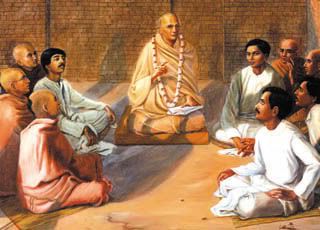
Association of spiritually advanced devotees is essential for making progress in love for Krishna, as is avoiding the detrimental affects of offending such great or even ordinary devotees. In my experience the creepers of the Vaishnava devotees are significantly intertwined. For most of us the first devotee we met was not our guru, and we didn’t see our guru often, but served with other devotees—being helped by them in a thousand ways. If Prabhupada or our guru hadn’t made (or uncovered) devotees of Krishna it is doubtful we would be one.
By associating in a spiritual service-oriented way with devotees we gain strength and perseverance on the bhakti path and also are able to fulfill our human needs for society, friendship and love. Like all relationships there is a honeymoon period where we may easily love or appreciate devotees with minimal reservations, not taking their faults very seriously. We feel determined to keep the association of devotees and avoid bad association. Then when the inevitable relationship bubble bursts and our conditioned eyes and false ego becomes prominent again, we may begin to measure and evaluate the devotees, seeing their faults as serious. It is also natural human psychology to notice our own faults in others. We need to keep this in mind.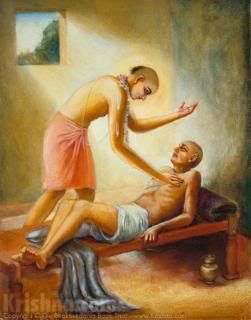
The Shrimad Bhagavatam describes a third class devotee as one who sees the Lord only in the Temple and follows the religious formularies, but doesn’t respect or value—if they recognize them at all—the devotees (especially advanced devotees) of the Lord. Although we are encouraged to associate with “like minded” devotees, this doesn’t mean avoiding pure devotees.
Actually the association of more spiritually situated devotees is the most important kind of association to search out and take advantage of. Our heart is compared in the Shrimad Bhagavatam to a crystal which reflects or becomes similar to whatever type of person one spends significant time with. The power of such association should not be underestimated. In fact it is said that by even a moment’s association with a pure devotee all perfection can be obtained. Of course this doesn’t mean that our work is done with only a moments association—it means our endeavor has just begun with such inspiration to progress in bhakti.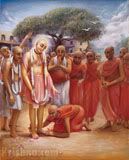
Thus, even though we have a pure devotee for a guru, our normal association and habits rule us. As it is said, “birds of a feather flock together”—but this can be good or bad. For instance, if we only associate with those who tend to criticize other devotees or people in general in the name of glorifying their guru’s greatness, we keep ourselves from making spiritual advancement. Spiritual life is about change, and we are meant to develop all the good qualities of a devotee, which include appreciation of the good qualities in others, and not having a fault find mentality. To avoid such bad propensities we are advised to keep the association of advanced devotees decorated with good qualities.
We need to be careful in our evaluation of devotees and try to see according to Vedic scriptures which extol the glories of pure devotees. We don’t want to just parrot the opinions of critical people. I am not speaking of blindly accepting a person just by their devotional looks, but of having an attitude of gratitude for being given the gift of devotional service, and finding a way to appreciate other bhakti practitioners, even if we don’t agree with them, or believe they are less then ideal. We certainly want Krishna to be merciful and generous with ourselves, so why not with others? Anyone who is trying their level best to remember and serve Krishna and their guru, is considered by Krishna to be saintly, even if there is some shortcoming or deviation in their character due to their past conditioning [Bg 9.30].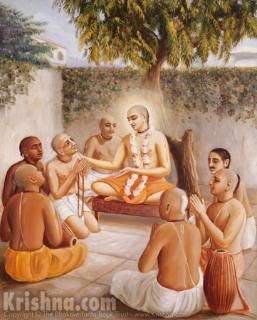
From another perspective the Gita teaches us that we are our faith, and this determines what we give our energy to. So then, what do we have faith in? Do we have faith in the fallen condition of people who come to Krishna, or faith in the purifying power of the holy name and spiritual association with advanced devotees? In a nutshell these two things are what Krishna consciousness is all about—chanting the holy name purely, and keeping good spiritual association.
So I’m speaking of a habit or propensity to criticize others, and the goal of being free from this by being spiritually absorbed in our taste for Krishna consciousness. With such a spiritual taste we will have no time or stomach for criticize anyone due to our spiritual absorption. Krishna conscious absorption in love will carry us to Krishna, but material absorption or criticism will keep us bound to take birth after birth in the material world. Throughout our life and also on special holy days as have just passed, it is helpful to reflect on our mind's absorption, which means what is the focus of our life. Our "focus" means our attachments which will determine our future in this life and the next. [see Bhagavad-gita 8th chapter]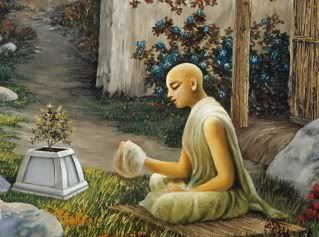
The first offense to the holy name is to criticize a person who has dedicated his or her life to propagating the holy name. This fact should give us pause about making superficial assumptions without really knowing a person well. We find that of the disciples of Lord Chaitanya, Raghunatha das Goswami would never speak or hear any criticism of a Vaishnava devotee of the Lord. Raghunatha wanted to avoid seeing devotees externally or having a familiar attitude toward them and risk offending or minimizing them. He appreciated the value and rarity of Krishna devotees, and knew that it is difficult to know where a person is on their spiritual journey.
We also find in the Chaitanya Charitamrita narrations of those envious persons who strongly criticized or continually blasphemed great devotees. The result was heavy karmic reactions like leprosy. However, they also often received redemption by surrendering to the devotee they criticized or tried to defame and then by Lord Chaitanya. Much more unfortunate was the “professional fault finder” Ramachandra Puri who always pointed out imaginary faults in others—even Lord Chaitanya himself—but never seemed to suffer from it. He offended his guru, and it seemed his reaction was to keep criticizing devotees his whole life and to create a huge stock of future suffering. So we don’t want to become a professional fault finder and create a very dark future.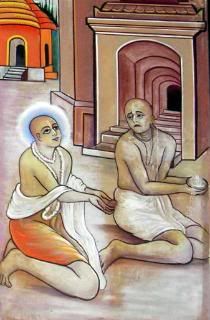
We need to ask ourselves how we can know another’s heart when we don’t know our own or aren’t yet perfect in our spiritual life? We expect that Krishna will be merciful to us—fallen as we are—so why with not others? We are all standing in a line for mercy. If someone who in our estimation is behind us—or is fallen—gets the mercy first or seems to be excused for some wrong committed, we can’t complain that we were before them in line, or are of better character. Otherwise we may have to go to the back of the “mercy” line ourselves.
Although we do have much to do in our spiritual life in our efforts to please our Gurus and Krishna, ultimately it is by the mercy of Krishna that we make advancement. And mercy means we don’t deserve it, or can’t exactly tell how it has come about. Prabhupada often spoke of “causeless mercy” or the gracious extension of kindness without reason. At the same time we may impede our spiritual progress by making offenses to great devotees. The devotee may excuse us, but Krishna will not tolerate offenses to his dear servants.
Life is short and we could die at any moment. Rather than going on a campaign to innumerate what we may see as the innumerable faults and short comings of a devotee, it is better if we examine our own hearts. We have often heard our param guru (our guru's guru), Shrila Bhaktisiddanta Sarasvati Thakur admonish those who criticize Vaishnavas instead of finding their personal faults and shortcomings to be purified from their heart. As it is said in everyday life in the country, when you point your finger at someone, three point back to you!
A superlative devotee is one who is completely free from the propensity to criticize others. If they do see faults it is only to help that person, and is never made with malice or envy. Great souls are saddened by the suffering of others and endeavor to help awaken people’s dormant spiritual consciousness—the real solution to every soul’s problems. Let us take advantage of such saintly devotees and avoid seeing them materially or superficially. This will call our spiritual progress.
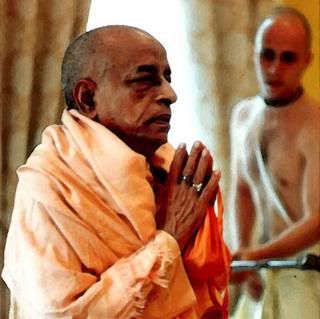
Comments
Dhanyavad Prabhuji
Dhanyavad Prabhuji
Dhanyavad Prabhuji
I just wanted to let devotees much like me know about the dangers of offending a devotee. I quoted a passage from the Vaishnav Reminder tool and placed a link to the following article.
Thanks to the editor of ISKONDESIRETREE it looks much better and all the glories to that devotee for this article..
Hari Bol!!!..